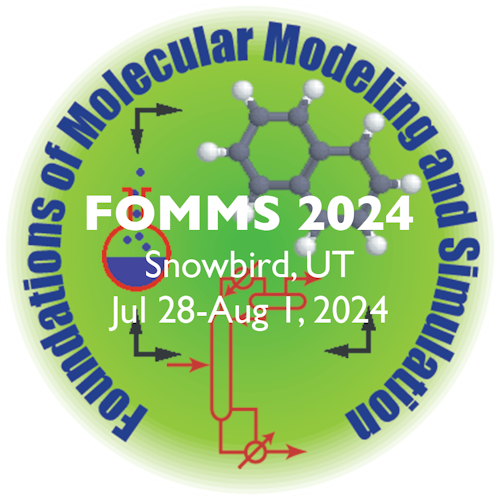FOMMS 2003, July 6-11, 2003, Keystone Resort, CO, USA
Co-chairs
- James F. Ely, Colorado School of Mines
- George Jackson, Imperial College
Senior Advisors
- Peter T.Cummings (Vanderbilt University and Oak Ridge National Laboratory)
- Phillip R. Westmoreland (University of Massachusetts),
Program Committee
- Anne M. Chaka (National Institute of Standards and Technology)
- Anthony M. Dean (Colorado School of Mines)
- David Frurip (Dow Chemical)
- Sharon Glotzer (University of Michigan)
- Joseph T. Golab (British Petroleum)
- Matthew Neurock (University of Virginia)
- Tomoshige Nitta, (Osaka University)
- John P. O'Connell (University of Virginia)
- Dominic Tildesley (Unilever)
Topics of Special Interest
- Nanoscale systems
- Molecular Materials Design
- Conceptual Chemical Process Design
- Molecular Scale Reaction Engineering
- Molecular Rheology
- Multiple Time Scale and Mesoscopic Simulation Techniques
- Future Trends in Molecular Modeling, Simulation and Design
Sessions
- Industrial Applications
- Biological Applications
- Polymeric Materials
- Electronic Materials
- Nanoscience and Nanotechnology
- Advances in Molecular Simulation Techniques
- Reaction Engineering
- Future Vision
Invited Speakers
- Dominic Tildesley, Unilever
Keynote Address: Linking atomistic and mesoscale simulation - surfactant and polymer dissolution - Joseph Golab, BP
What's Rational about Computational Catalyst Design? - Cristina Thomas, 3M
Industrial Uses of Computational Models in the Development of Novel Nanosystems - Sami Karaborni, Merck
Computer simulations of nanostructures in the petrochemical and pharmaceutical industries - Sangtae Kim, Eli Lilly
Informatics in Pharmaceutical Research and Developmen - Ken Dill, UCSF
How Do Proteins Fold? And How Should Computers Fold Them? - Ron Larson, UMich
Principles for Coarse-Graining Polymer Molecules in Simulations of Polymer Fluid Mechanics - Masao Doi, Nagoya
OCTA-Open Computational Tool for Advanced Material Technology - Doros Theodorou, Patras
Understanding and Predicting Structure-Property Relations in Polymeric Materials Through Molecular Simulations - Krishnan Raghavachari, IU
Electronic structure studies of semiconductor surface chemistry - Dimitrios Maroudas, UMass
Recent contributions of molecular simulation to the modeling of electronic materials processing and reliability - Alain Fuchs, UParis-LCP
Adsorption and Separation Processes in Nano-Porous Materials - Anabella Selloni, Princeton
Structure of TiO2 surfaces and their interfaces with water - Peter Cummings, Vanderbilt
Computational Nanoscience - Dave Kofke, UB/SUNY
Getting the Most from Molecular Simulation - Prem Paul, Unilever
Linking atomistic and mesoscale simulations of water soluble polymers - Thanh Truong, Utah
Bridging Fundamental Chemistry and Reaction Engineering - Matt Neurock, UVA
Atomically Engineered Active Sites and Environments for Supported Metal Catalysts - Tony Rappe, CSU
Sketching a Path through the Hydrocarbon Oxidation Maze - William H. Green, MIT
Predictive Chemical Kinetics for Complex Systems - Alex Bell, UCB
Challenges for the Application of Quantum Chemical Calculations to Problems in Catalysis - Costas Pantelides, Imperial College
Computational Chemistry and Process Systems Engineering: Synergies and Challenges - Ellen Stechel, Ford
A Glimpse at the Future of Chemical and Materials Modeling and Simulation in the Automotive Industry
